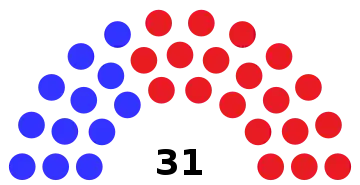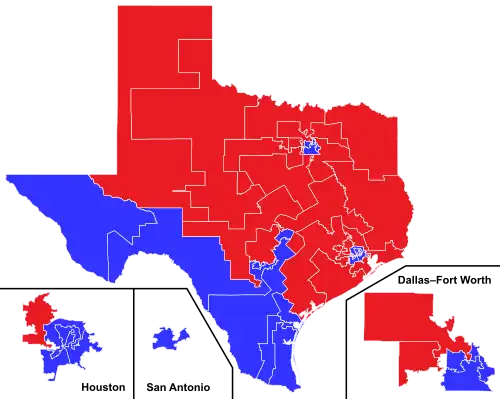Texas Senate
The Texas Senate is the upper house of the Texas Legislature, with the Texas House of Representatives being the lower house. Together, they compose the state legislature of the state of Texas.
Texas Senate | |
|---|---|
| Eighty-seventh Texas Legislature | |
 | |
| Type | |
| Type | of the Texas Legislature |
Term limits | None |
| History | |
New session started | January 10, 2023 |
| Leadership | |
Majority Leader | |
Minority Leader | |
| Structure | |
| Seats | 31 |
 | |
Political groups | Majority
Minority |
Length of term | 4 years (with one 2-year term each decade) |
| Authority | Article 3, Texas Constitution |
| Salary | $7,200/year + per diem |
| Elections | |
| First-past-the-post | |
Last election | November 8, 2022 (31 seats) |
Next election | November 5, 2024 (15 seats) |
| Redistricting | Legislative Control |
| Meeting place | |
_-_084.jpg.webp) | |
| State Senate Chamber Texas State Capitol Austin, Texas | |
| Website | |
| Texas State Senate | |
There are 31 members of the Senate, representing single-member districts across the U.S. state of Texas, with populations of approximately 940,000 per constituency, based on the 2020 U.S. Census. Elections are held in even-numbered years on the first Tuesday after the first Monday in November.
There are no term limits. Terms are four years in length, with one two-year term each decade. Senators are divided into two groups based in part on the intervening Census:
- In elections in years ending in 2 (the election after the Census), all 31 seats are up for election.
- Once the Senate meets in session after said election, the Senators will participate in a drawing to determine their election cycle:
- One-half will have a 2-4-4 cycle, whereupon the seat would stand for election in two years (the year ending in 4), followed by two four-year cycles (the years ending in 8 and 2).
- The other half will have a 4-4-2 cycle, whereupon the seat would stand for election in four years (the year ending in 6), followed by another four-year cycle (the year ending in 0) but then the seat would stand for election in only two years (the year ending in 2).
As such, every two years, about half of the Texas Senate is on the ballot.
The Senate meets at the Texas State Capitol in Austin. The Republicans currently control the chamber, which is made up of 19 Republicans and 12 Democrats.
Leadership
The Lieutenant Governor of Texas serves as the President of the Senate. Unlike most lieutenant governors who are constitutionally designated as presiding officers of the upper house, the Lieutenant Governor regularly presides over the chamber rather than delegate this role to the President Pro Tempore. The Lieutenant Governor's duties include appointing chairs of committees, committee members, assigning and referring bills to specific committees, recognizing members during debate, and making procedural rulings. The Lieutenant Governor may also cast a vote should a Senate floor vote end in a tie. If the Senate votes to dissolve itself into the Committee of the Whole, in which all members are part of the Committee, the President Pro-Tempore presides over the proceedings, with the Lieutenant Governor acting as a regular voting member. Due to the various powers of committee selection and bill assignment, the Lieutenant Governor of Texas is considered one of the most powerful lieutenant governorships in the United States.
Unlike other state legislatures, the Texas Senate does not include majority or minority leaders. Instead, the President Pro Tempore is considered the second most powerful position, and can be reserved to any political party in the chamber regardless if the party is a majority or not. Presidents Pro Tempore are usually the most senior members of the Senate. The President Pro Tempore presides when the Lieutenant Governor is not present or when the legislature is not in regular session.
Leaders
| Position | Name | Party | Residence | District |
|---|---|---|---|---|
| Lieutenant Governor/President of the Senate | Dan Patrick | Republican | Houston | Elected Statewide |
| President Pro Tempore | Charles Schwertner | Republican | Georgetown | 5 |
History
Quorum-busting
There have been at least three cases of quorum-busting in Texas Senate history. The first case was in 1870, with the Rump Senate, followed by the 1979 Killer Bees[1] and finally the "Texas Eleven" in August 2003 during the controversial mid-decade redistricting plan at the time.[2]
Committee structure
The following represents the Senate committee structure for the 88th Legislature (numbers in parentheses are the number of committee members, as appointed by the President of the Texas Senate).[3]
- Administration (7)
- Border Security (5)
- Business and Commerce (11)
- Criminal Justice (7)
- Education (13)
- Under this Committee, a Subcommittee on Higher Education (5)
- Finance (17)
- Health & Human Services (9)
- Jurisprudence (5)
- Local Government (9)
- Natural Resources and Economic Development (9)
- Nominations (9)
- State Affairs (11)
- Transportation (9)
- Veteran Affairs (7)
- Water, Agriculture and Rural Affairs (9)
In addition to these committees, there are also six joint committees composed of members of both the State Senate and House:
Current composition
| Affiliation | Party (Shading indicates majority caucus) |
Total | |||
|---|---|---|---|---|---|
| Republican | Democrat | Vacant | |||
| January, 2023 | 19 | 12 | 31 | 0 | |
| Latest voting share | 61% | 39% | |||

List of members
†Elected in a special election
Notable past members
- Edward Clark, Lieutenant Governor of Texas (1859–1861), Governor of Texas (1861).
- Wayne Connally, Senator from Wilson County (1967–1973), brother of Governor John Connally.
- Lloyd Doggett, Texas Supreme Court Justice (1989–1994), U.S. House of Representatives (1995–present).
- Robert L. Duncan, State Senator from Lubbock, 1996–2014; Chancellor of the Texas Tech University System since 2014
- Chet Edwards, U.S. House of Representatives (1991–2011).
- James W. Flanagan, U.S. Senate (1870–1875).
- Glenn Hegar, current Texas Comptroller of Public Accounts (2015–present).
- John Ireland, Texas Supreme Court Justice (1876), Governor of Texas (1883–1887).
- Eddie Bernice Johnson, U.S. House of Representatives (1993–2023).
- Rienzi Melville Johnston, U.S. Senate (1913).
- Barbara Jordan, U.S. House of Representatives (1973–1979).
- Earle Bradford Mayfield, U.S. Senate (1923–1929).
- William Neff "Bill" Patman, Senator from Jackson County (1961–1981), U.S. House of Representatives (1981–1985).
- Dan Patrick, current Lieutenant Governor of Texas (2015–present).
- Jerry E. Patterson, Commissioner of the Texas General Land Office (2003–2015).
- Lawrence Sullivan Ross, Governor of Texas, (1887–1891).
- Joseph D. Sayers, Lieutenant Governor of Texas (1879–1881), U.S. House of Representatives (1885–1899), Governor of Texas (1899–1903).
- Allan Shivers, Lieutenant Governor of Texas (1946–1949), Governor of Texas (1949–1957).
- Preston Smith, Governor of Texas (1969–1973).
- Frank Tejeda, U.S. House of Representatives (1993–1997).
- James W. Throckmorton, Governor of Texas (1866–1867), U.S. House of Representatives (1875–1879, 1883–1887).
- Carlos Truan, Senator from Corpus Christi (1977–2003); author of Texas Bilingual Education Act.
- Jim Turner, U.S. House of Representatives (1997–2005).
- Matthias Ward, U.S. Senate (1858–1859).
- Ferdinand C. Weinert, Texas House and Texas Senate (1893–1935), Texas Secretary of State (1913).
- Louis Wigfall, U.S. Senate (1859–1861).
- Charles Wilson, U.S. House of Representatives (1973–1997).
- Roy Blake, Sr., Senator from Nacogdoches County, Texas, (1978-1989), [President Pro Tempore] (1987–1989).
Past composition of the Senate
The Senate was continuously held by Democrats from the end of the Reconstruction era until the Seventy-fifth Texas Legislature was seated in 1997, at which point Republicans took control. The Republican Party has maintained its control of the Senate since then.
Obsolete districts
- Texas Senate, District F (1846–1848)
- Texas Senate, District 32 (1853–1866)
- Texas Senate, District 33 (1853–1866)
See also
- Texas Legislature
- Texas House of Representatives
- List of presidents pro tempore of the Texas Senate
- Texas Government Newsletter, voting history of the Texas Legislature.
Notes
- This committees has six members: the Speaker of the House and the Lieutenant Governor (who serve as joint chairs), the Chair of the Senate Finance Committee, the Chairs of the House Appropriations and Ways and Means Committees, and one Senator appointed by the Lieutenant Governor; the Committee in turn hires and oversees the State Auditor of Texas.
- This committee has ten members: the Speaker of the House and the Lieutenant Governor (who serve as joint chairs), the Chair of the Senate Finance Committee, the Chairs of the House Appropriations and Ways and Means Committees, three Senators appointed by the Lieutenant Governor, and two Representatives appointed by the Speaker.
- This committee has six members: the Speaker of the House and the Lieutenant Governor the Chair of the House Appropriations Committee, two Senators appointed by the Lieutenant Governor, and one Representative appointed by the Speaker.
- This committee has 14 members: the Speaker of the House and the Lieutenant Governor (who serve as joint chairs), the Chair of the House Administration Committee, six Senators appointed by the Lieutenant Governor, and five Representatives appointed by the Speaker.
References
- "12 Texas State Senators, Claiming Political Victory, Come Out of Hiding". New York Times. May 23, 1979. Retrieved November 9, 2021.
- Fikac, Peggy, August 21, 2003, Senators' 1870 walkout also drew GOP's wrath Reconstruction-era tiff led to arrests and one expulsion, San Antonio Express-News
- "Wednesday, January 11, 2023 - 2nd Day".
- "Texas State Auditor's Office - Legislative Audit Committee".
- "Legislative Budget Board".
- "Legislative Reference Library |". lrl.texas.gov. Retrieved September 2, 2023.
- "Texas Legislative Council". tlc.texas.gov.
External links
 Media related to Senate at Wikimedia Commons
Media related to Senate at Wikimedia Commons- Official Texas Senate website